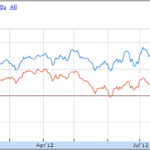If you’re an expert investor because you’ve developed a real detailed knowledge of a market sector and the companies in it – and you generally profit from that expert knowledge on a three steps forward, two steps back type of basis, then no-one would think this was “strange†in any way.
But try telling someone that you’re a professional gambler and, after they’ve expressed a little astonishment, they’ll start asking you for a few tips here and there.
Yet both these things are, in essence, the same thing. OK – for the purist, not all investing is gambling because this isn’t, generally speaking, a zero-sum game. Instead, the whole market is expanding as the companies in which you’re investing make steady progress, get bigger and more profitable and pay out good dividends along the way, if you’re lucky.
But how about trading on foreign exchange markets? This is far closer to the kind of zero-sum game most gambling boils down to – but again, if you profit from your shrewd judgement and courage here, no-one thinks it’s odd. Instead you’re a “professional investor†or a Forex trader etc.
So basically – gamblers aren’t treated equally by society because most people don’t understand that it’s essentially the same thing. But they should be – and here’s why.
If you’ve developed a true insight into a sport you love, and you follow some basic value-based principles – and you’re industrious enough to put the extra research effort in, have the courage of your own convictions and (above all…) maintain a strict self-discipline; then why should you not profit from your expertise?
Of course, this type of approach has become a lot more realistic for ordinary punters in recent years thanks to the advent of the internet and the development of large betting exchanges which are simply markets of buyers and sellers like any other.
Betfair is the world’s biggest betting exchange and all major sports are covered on here. The trick is in developing your expertise, making value-based judgement calls and betting (or “laying†on the other side of the market) and trying to make steady progress.
But as a wise man once said – no-one has ever won a game of chess by gambling on every move. In other words – you have to be prepared to move backwards in order to move forwards sometimes. Or more simply put – you can’t win them all; the trick, instead, is to come out ahead little by little and to try and generate a reasonable return.
After all, if you were a full-time private investor and you managed to achieve a steady profit of, let’s say, around 10% per annum as a long-term average, then the finance industry would see you as a highly successful investor. So keep your expectations realistic and have a look at an area you know well.
So as a hypothesis, let’s presume you’re a bit of an expert on the prospects of Rugby Union games; then with Betfair for example you’re looking for the best value. Let’s say Australia are playing England at Twickenham and, given all your detailed knowledge of everything to do with the match, you think Australia should be somewhere around even money – they have a 50-50 chance in other words. Now let’s also presume that the market is more dominated by slightly patriotic English fans hoping for a home win at Twickenham and that Australia are 5/4 chances. You have to discount the average of around five per cent that exchanges like Betfair take from the winning bet, but you’re still doing well if Australia win.
In fact, what those odds are saying is that Australia will win four out of every nine games played by these two sides as they are “today†whilst England would win five, on average (we’re ignoring the draw possibilities for convenience’s sake for this example). You, on the other hand, think Australia would be more likely to win 4.5 games from nine, as a long-term mean average based on the teams and prospects as they “now†are – ergo you back Australia at 5/4.
Now if you place enough bets over a long enough period of time, your judgement will be very effectively tested by Mister Market. So can you beat him? Well the trick is to try with relatively small amounts of cash that you aren’t particularly bothered about losing – but to try to treat the overall amount as if it’s a hundred or a thousand times as much. Then gamble with a small percentage of the overall pot only on each occasion.
If you begin to prove to yourself that you are capable of winning out and making a decent profit over, let’s say, a hundred shrewd bets, then your stake will be growing in line with your pot – and you may decide to gradually increase that pot with the introduction of a little more cash.
But try and do this gradually – always maintain your self-discipline – and see if you can do it.











{ 0 comments… add one now }